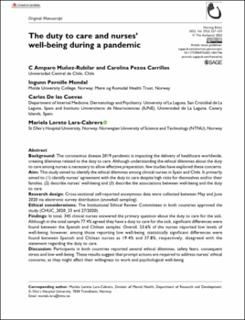| dc.contributor.author | Muñoz-Rubilar, C Amparo | |
| dc.contributor.author | Carrillos, Carolina Pezoa | |
| dc.contributor.author | Mundal, Ingunn Pernille | |
| dc.contributor.author | De Las Cuevas, Carlos | |
| dc.contributor.author | Lara Cabrera, Mariela Loreto | |
| dc.date.accessioned | 2023-04-27T12:04:02Z | |
| dc.date.available | 2023-04-27T12:04:02Z | |
| dc.date.created | 2022-02-14T10:45:12Z | |
| dc.date.issued | 2022 | |
| dc.identifier.citation | Nursing Ethics. 2022, 29 (3), 527-539. | en_US |
| dc.identifier.issn | 0969-7330 | |
| dc.identifier.uri | https://hdl.handle.net/11250/3065327 | |
| dc.description.abstract | Background: The coronavirus disease 2019 pandemic is impacting the delivery of healthcare worldwide, creating dilemmas related to the duty to care. Although understanding the ethical dilemmas about the duty to care among nurses is necessary to allow effective preparation, few studies have explored these concerns. Aim: This study aimed to identify the ethical dilemmas among clinical nurses in Spain and Chile. It primarily aimed to (1) identify nurses’ agreement with the duty to care despite high risks for themselves and/or their families, (2) describe nurses’ well-being and (3) describe the associations between well-being and the duty to care. Research design: Cross-sectional self-reported anonymous data were collected between May and June 2020 via electronic survey distribution (snowball sampling). Ethical considerations: The Institutional Ethical Review Committees in both countries approved the study (CHUC_2020_33 and 27/2020). Findings: In total, 345 clinical nurses answered the primary question about the duty to care for the sick. Although in the total sample 77.4% agreed they have a duty to care for the sick, significant differences were found between the Spanish and Chilean samples. Overall, 53.6% of the nurses reported low levels of well-being; however, among those reporting low well-being, statistically significant differences were found between Spanish and Chilean nurses as 19.4% and 37.8%, respectively, disagreed with the statement regarding the duty to care. Discussion: Participants in both countries reported several ethical dilemmas, safety fears, consequent stress and low well-being. These results suggest that prompt actions are required to address nurses’ ethical concerns, as they might affect their willingness to work and psychological well-being. Conclusion: Our findings shed light on the ethical dilemmas nurses are facing related to the duty to care. Not only has the coronavirus disease 2019 pandemic given rise to ethical challenges, but it has also affected nurses’ well-being and willingness to work during a pandemic. Keywords: attitudes of health personnel, COVID-19 pandemic, duty to care, ethical issues nurses, psychological well-being, willingness to work | en_US |
| dc.description.abstract | The duty to care and nurses' well-being during a pandemic | en_US |
| dc.language.iso | eng | en_US |
| dc.publisher | SAGE Publications | en_US |
| dc.relation.uri | https://doi.org/10.1177/09697330211041746 | |
| dc.rights | Navngivelse 4.0 Internasjonal | * |
| dc.rights.uri | http://creativecommons.org/licenses/by/4.0/deed.no | * |
| dc.title | The duty to care and nurses' well-being during a pandemic | en_US |
| dc.title.alternative | The duty to care and nurses' well-being during a pandemic | en_US |
| dc.type | Peer reviewed | en_US |
| dc.type | Journal article | en_US |
| dc.description.version | publishedVersion | en_US |
| dc.source.pagenumber | 527-539 | en_US |
| dc.source.volume | 29 | en_US |
| dc.source.journal | Nursing Ethics | en_US |
| dc.source.issue | 3 | en_US |
| dc.identifier.doi | 10.1177/09697330211041746 | |
| dc.identifier.cristin | 2001195 | |
| cristin.ispublished | true | |
| cristin.fulltext | original | |
| cristin.qualitycode | 2 | |

